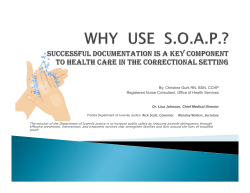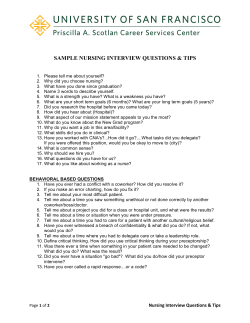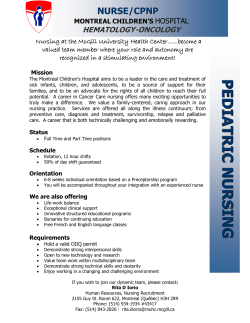
College of Registered Nurses of Nova Scotia
College of Registered Nurses of Nova Scotia tia How to Submit a Complaint from a Member of the Public When submitting a complaint, please: 1. Address your letter of complaint to the Executive Director of the College of Registered Nurses of Nova Scotia. 2. State that you are submitting a complaint. 3. Provide: • the name of the nurse • your relationship with the nurse, (e.g. provided care (a) to you; (b) to a relative; or (c) other 4. List and number the incidents about which you are complaining. If possible, give the following details: • date(s) and time(s) of incident(s) Dear Executive Director: • locations where incident(s) occurred (e.g., I hereby make a formal complaint against Mary Smith, RN room number, conference room, home) • description of the incident(s), and Reason for complaint • names of those who may have witnessed Incident #1- On January 6, 2008, at approximately 10:00 the incident(s). 5. Letters of complaint should be marked ‘CONFIDENTIAL’ and addressed to: Executive Director College of Registered Nurses of Nova Scotia 4005-7071 Bayers Road, Halifax, NS B3L 2C2 For further information contact: Darlene Mott, Professional Conduct Consultant dmott@crnns.ca 902.491.9744, ext. 227 or Matthew Lafond, Professional Conduct Consultant mlafond@crnns.ca 902.491.9744, ext. 245 p.m., Mary Smith left my husband, who is a confused and physically disabled patient, unattended in the bathroom for 45 minutes. Despite repeated calls for help, which were brought to the attention of Mary Smith by two other patients, Mr. S. and Ms. M., Mary Smith refused to leave the desk where, according to Mr. S., she was writing on charts. My husband finally attempted to leave the bathroom without assistance. This attempt led to a fall, which resulted in a fractured right hip. s m a e l p Incident #2 – On July 23, 2008, between 9:00 p.m. - 10:00 p.m., in Room 2463 West, I saw Mary Smith slapping a patient, Ms. A. on the right leg when Ms. A. refused to walk from her chair to the bed. Jane Doe, LPN, was caring for a patient in the next bed to Ms. A. and she also saw this incident. Yours truly, Joan Smith Phone No: Sample Letter of Complaint ia Suite 4005-7071 Bayers Road, Halifax, NS B3L 2C2 Canada T 902.491.9744 Toll-free (NS) 1.800.565.9744 F 902.491.9510 E info@crnns.ca www.crnns.ca Definitions (Registered Nurses Act, 2006) “Complaint” means a notice in writing pursuant to this Act, indicating possible professional misconduct, conduct unbecoming the profession, incompetence or incapacity of a member. “Professional misconduct” includes such conduct or acts relevant to the profession that, having regard to all the circumstances, would reasonably be regarded as disgraceful, dishonourable or unprofessional that, without limiting the generality of the foregoing, may include: i. failing to maintain the standards of nursing practice or standards for nurse practitioners, ii. failing to uphold the Code of Ethics adopted by the College, iii. abusing a person verbally, physically, emotionally or sexually, iv. misappropriating personal property, drugs or other property belonging to a client or a member’s employer, v. inappropriately influencing a client to make or change a will or power of attorney, vi. wrongfully abandoning a client, vii.neglecting to provide care to a client, viii.failing to exercise appropriate discretion in respect of the disclosure of confidential information, ix. falsifying records, x. inappropriately using professional nursing status for personal gain, xi. promoting for personal gain any drug, device, treatment, procedure, product or service that is unnecessary, ineffective or unsafe, xii. publishing, or causing to be published, any advertisement that is false, fraudulent, deceptive or misleading, xiii.engaging or assisting in fraud, misrepresentation, deception or concealment of a material fact when applying for or securing registration or a licence to practise nursing or taking any examination provided for in this Act, including using fraudulently procured xiv.credentials, xv. taking or using the designation ‘registered nurse’, ‘nurse’, or any derivation or abbreviation thereof, or describing a person’s activities as ‘nursing’ in any advertisement or publication, including business cards, websites or signage, unless the referenced activity falls within the definitions of the ‘practice of nursing’ or the ‘practice of nurse practitioner’ pursuant to this Act (RN Act, 2006). “Conduct Unbecoming” means conduct in a member’s personal or private capacity that tends to bring discredit upon the nursing profession. “Incompetence” means the display of lack of knowledge, skill or judgment in a respondent’s care of a client or delivery of nursing services that, having regard to all the circumstances, rendered the respondent unsafe to practise at the time of such care of the client or delivery of nursing services or that renders the respondent unsafe to continue in practice without remedial assistance. “Incapacity” means the status whereby a respondent, at the time of the subject matter of a complaint or a report, pursuant to subsection 73(1) suffered from a medical, physical, mental or emotional condition, disorder or addiction that rendered the respondent unable to practise with reasonable skill or judgment or that may have endangered the health or safety of clients. © 2013 ia Suite 4005-7071 Bayers Road, Halifax, NS B3L 2C2 Canada T 902.491.9744 Toll-free (NS) 1.800.565.9744 F 902.491.9510 E info@crnns.ca www.crnns.ca
© Copyright 2025















